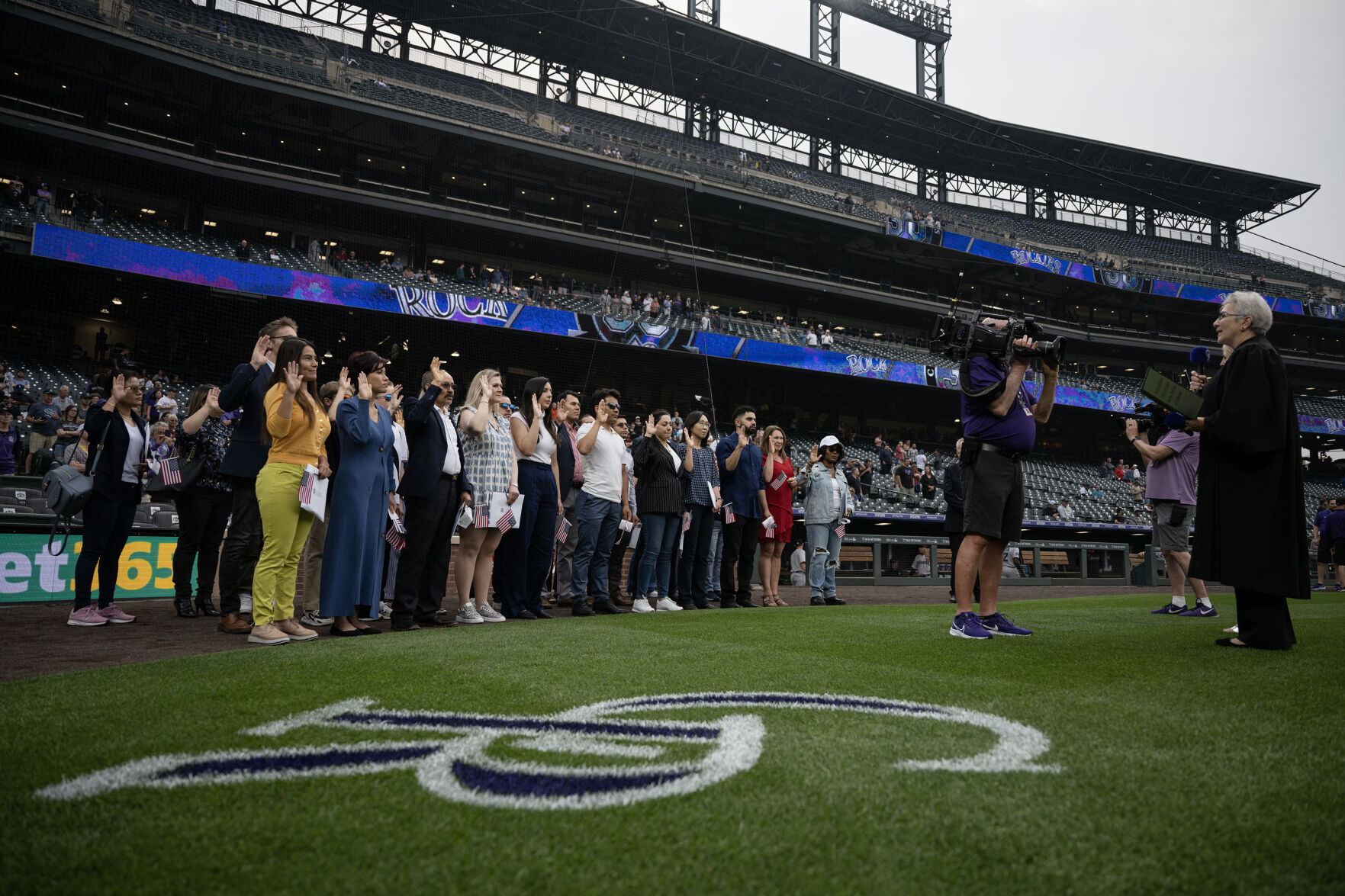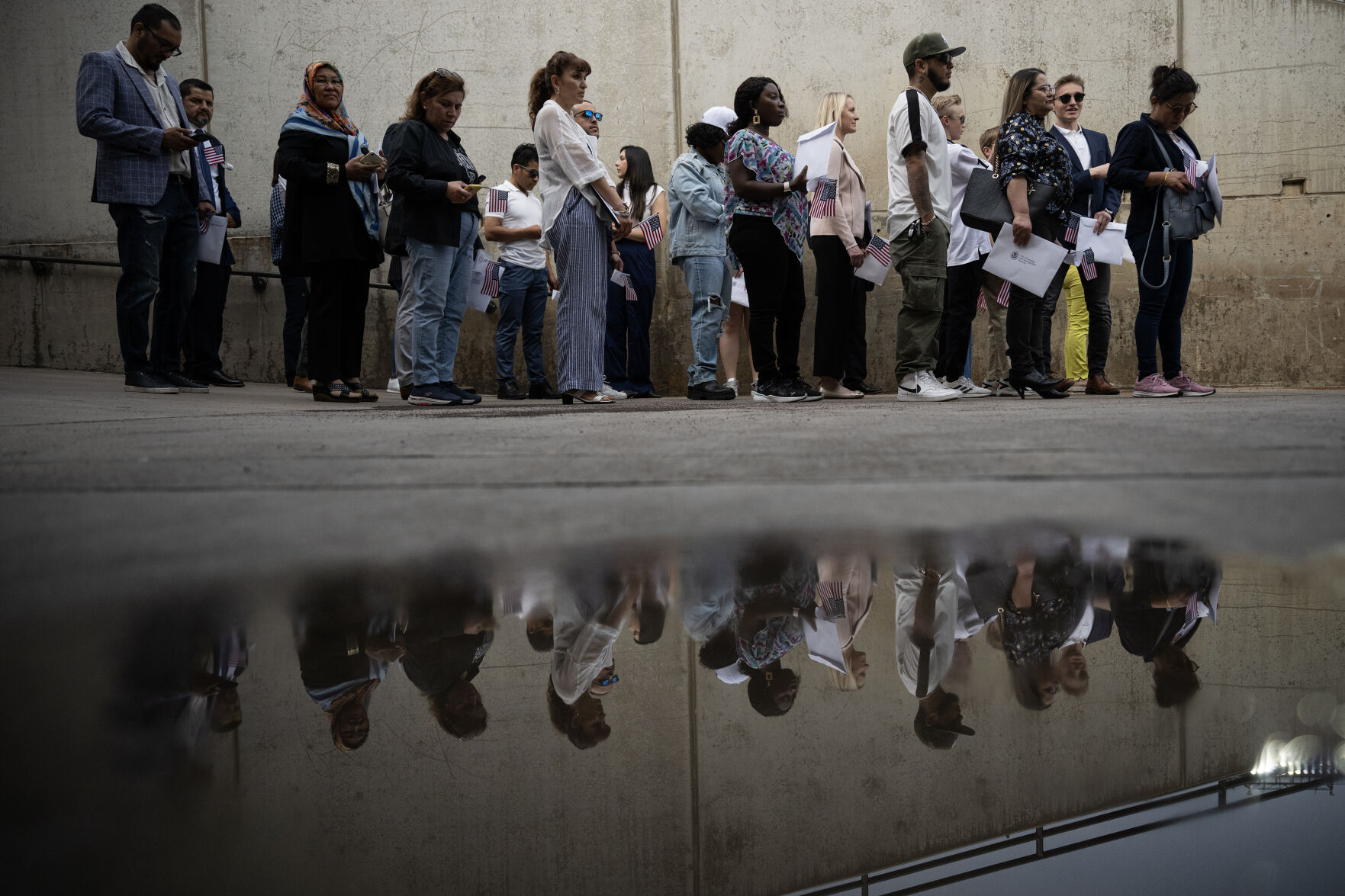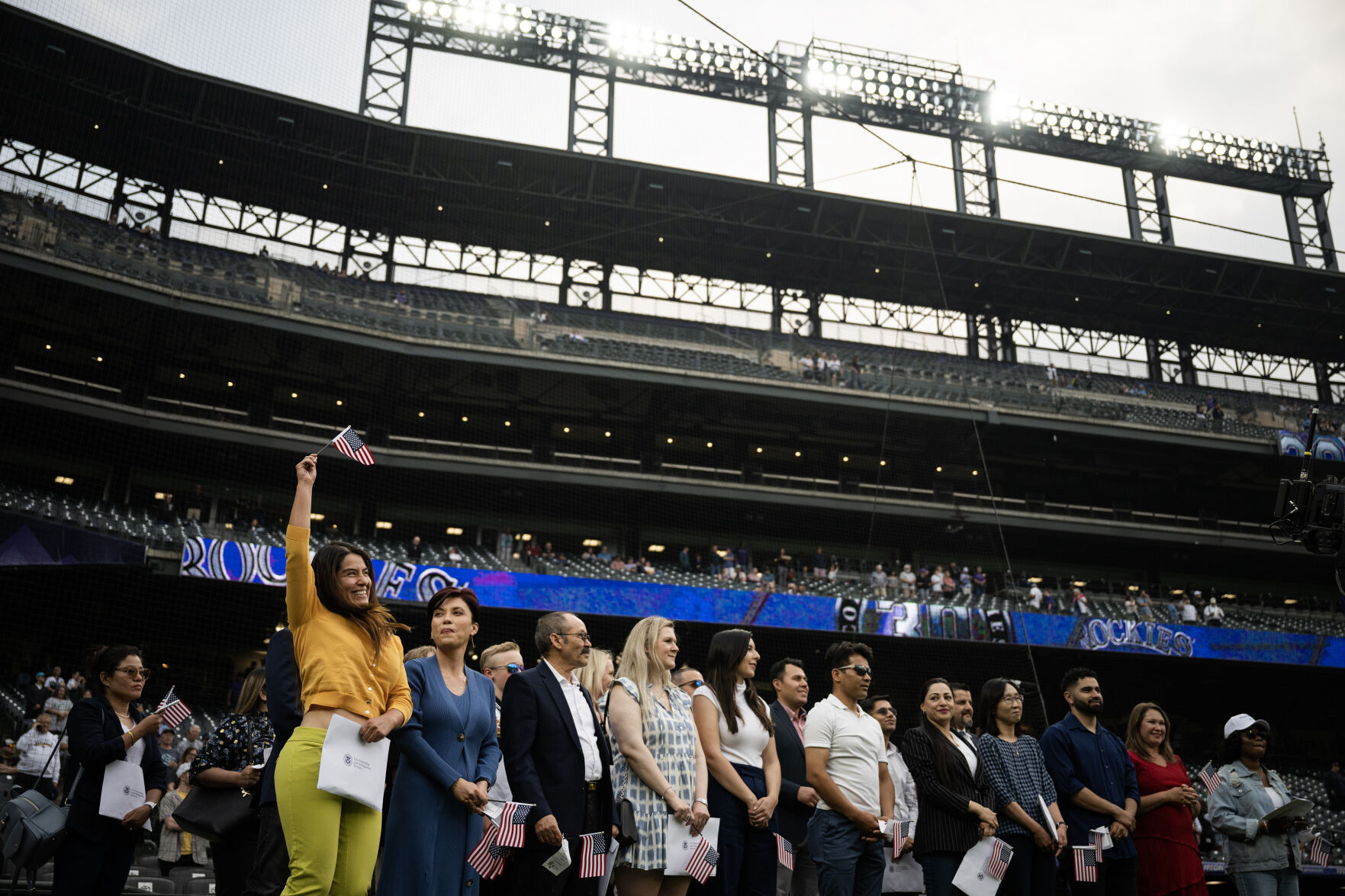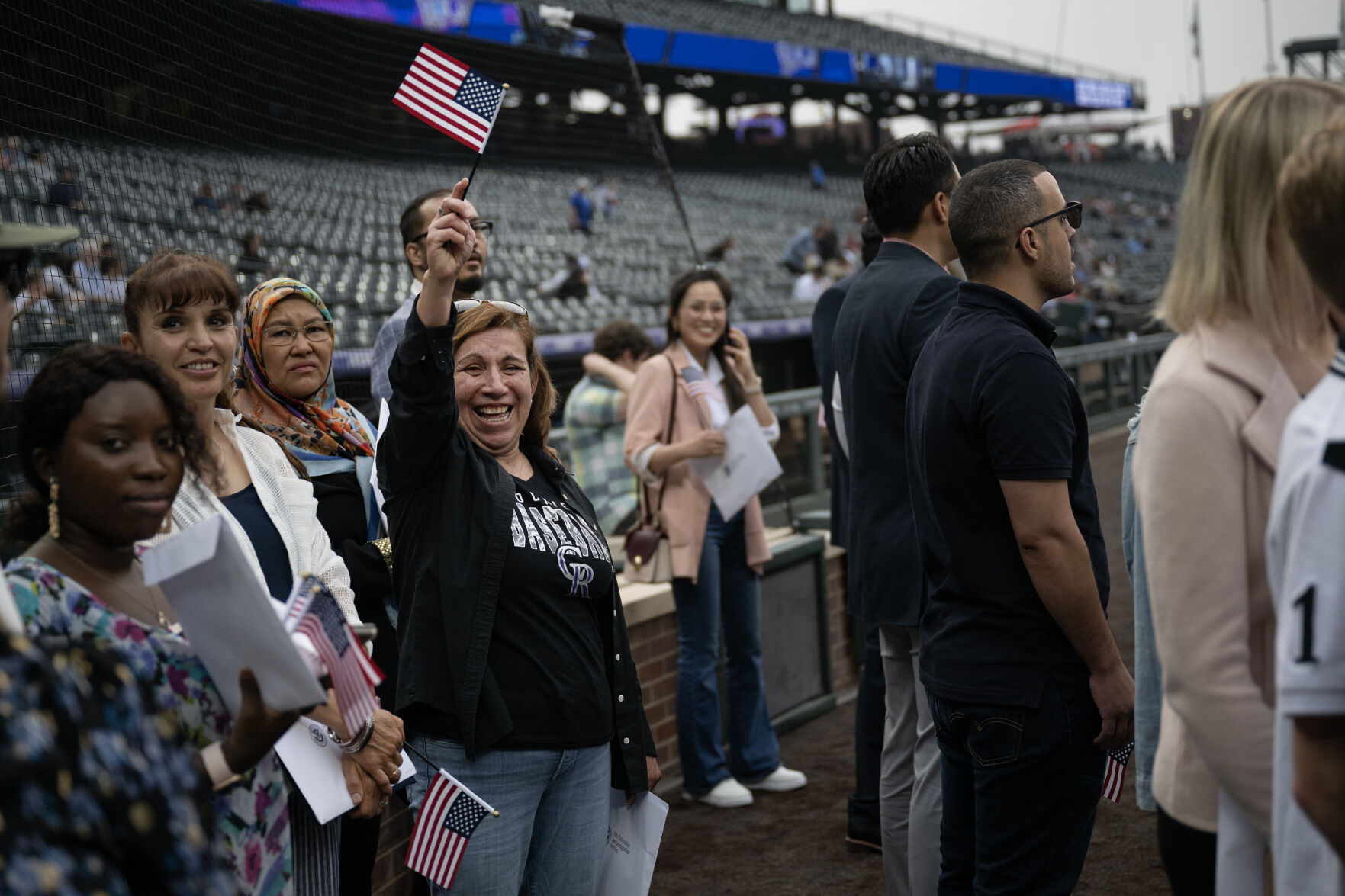Naturalization: The little-known, big-impact work of Colorado’s federal court | COVER STORY

“Fans, direct your attention to the field,” an announcer’s voice boomed over the mostly empty seats at Coors Field.
The Colorado Rockies’ game against the Miami Marlins was not ready to begin, nor were the teams in sight. Instead, cheers, waves and shouts of “god bless America” came in response to the 25 people huddled behind the home plate. All were immigrants, from 14 countries, who were taking the oath of allegiance to become new U.S. citizens.
“Welcome to this historic naturalization ceremony here at unforgettable Coors Field, home of our Colorado Rockies,” said U.S. Magistrate Judge Kristen L. Mix into a purple Rockies microphone with a camera inches from her face.
Lasting just over three minutes from start to finish, the new citizens took the nearly 100-year-old oath – which requires them to renounce “fidelity to any foreign prince (or) potentate” – and proceeded to wave tiny American flags and listen to a children’s choir sing the National Anthem.
Dinger, the Rockies’ dinosaur mascot, waded through the group. He gave high fives and leaned in to show a smiling Mix the baseball he was holding. Then the new citizens dispersed through the stadium to join their families and watch the game.
The May ceremony was the first of its kind at Coors Field. Mix, a baseball fan, attempted to coordinate a naturalization with the Rockies during 2022, noting in her pitch that other sports teams have hosted similar events. The team’s general counsel shot down the idea, as executive leaders were worried a ceremony would be too “political.”
For reasons that were unclear, however, the team changed its mind for 2023.
“We’re hopeful they’ll let us do it at least a couple more times. But we haven’t gotten a commitment yet,” Mix said afterward. “It’s a really interesting part about what we do and, honestly, it is the most fun in all of my tasks as a federal judge – conducting a naturalization ceremony.”

Behind the scenes
The first federal naturalization law came in 1790, when the First Congress provided for citizenship for free, White persons who lived in the U.S. for at least two years. Now, the government naturalizes nearly one million new citizens each year.
There are two types of ceremonies: administrative, which are run by U.S. Citizenship and Immigration Services, and judicial, which occur through the courts – specifically, the U.S. District Courts, whose members sometimes contrast the pleasant work of welcoming new citizens with their typical routine of deciding cases and, inevitably, making people unhappy.
“The district court has to do these in person because of the nature of what we’re providing,” said Mark Fredrickson, who works in the clerk’s office of Colorado’s federal trial court. “We’re providing a name change. That always has to be in front of a judge.”
For more than 12 years, Fredrickson has been the court’s point person for naturalization ceremonies. He is retiring at the end of the year. He estimated that court personnel spend 10 hours per month working on a single ceremony and related tasks.
Part of that work involves signing up judges to preside over the ceremonies. Fredrickson provides a script to the district judges and magistrate judges, with room for them to modify the speech.
“They all have their own views about immigration, I’m sure. And some of that comes through, but all of them are thrilled to be part of the legal process of doing this,” he said. “Some of them are appointed by Democrats, some are appointed by Republicans. Some are quite conservative, some are quite liberal. But they all support that process in slightly different ways.”
U.S. District Court Senior Judge John L. Kane told Colorado Politics that when the invitation comes for judges to sign up to preside over ceremonies, he quickly responds because there is high demand. In doing so, he has occasionally moved jury trials that were scheduled for the same day as a naturalization.
“Naturalization is a positive thing that judges do, as distinguished from sentencing people to prison or ruling against different parties in motions and so on,” he said. “It’s the kind of thing where – I don’t want to be trite about it – everybody wins.”
Voices of the naturalized
Two months after the small and brief Coors Field ceremony, 77 new citizens from 34 countries gathered at the federal courthouse in downtown Denver for a different iteration of the 200-year-old naturalization process. Presiding over the ceremony was U.S. District Court Judge Charlotte N. Sweeney, a recent appointee of Joe Biden who, by her own admission, is typically “first in line” to emcee the naturalizations.
Sweeney remarked that her family came to the country in the 1600s. Although the sample script encourages judges to talk about their own ancestry, Sweeney opted against it.
“Often, we forget to thank you for choosing us and thank you for joining our community,” she said instead.
Sweeney mentioned two of her colleagues who were fellow Biden appointees: U.S. District Court Judge Nina Y. Wang, who emigrated from Taiwan as a child, and appellate Judge Veronica S. Rossman, whose family came from the Soviet Union.
“America, as you know, is not a perfect country. We are in a political climate right now that makes it sometimes hard to be an American,” Sweeney elaborated. “But that is why we need you. We need people like you to stand up, speak up and make this country everything we dreamed it to be.”

She then turned the microphone over to the new citizens. The oldest, a 73-year-old Mexican woman with a black blazer and her hair pulled back in a bun, rose to say she waited a long time to become a citizen for family reasons.
“I came in 1970. I expected everybody to look like Jacqueline Kennedy, but I found everybody with flowers in their hair – long, dirty hair laying all over Boulder. And it was fascinating,” she said. “I made a career in the United States. The opportunities are great.”
A woman from Africa urged everyone in the room to “please believe in yourself.” A Burmese woman expressed her gratitude for the acceptance of immigrants from war-torn Myanmar, and asked for Americans to continue to welcome refugees from the region. A man from Afghanistan revealed he worked with the U.S. Army before immigrating. A man from the Congo said he came to the U.S. in order to be safe.
“I want to say to everyone, ‘There is no barrier in your dream. You are the only barrier in your life,'” he said.
With that, Sweeney ended the ceremony to greet the line of new citizens and their families, and to pose for pictures.
‘The best thing that I do’
For the first 100 years after Congress enacted a naturalization law, any court could act on citizenship applications. A 1905 report revealed the lack of oversight contributed to naturalization fraud, prompting Congress to refocus naturalization responsibilities on the federal judiciary.
By the 1980s, a new problem had arisen of backlogged courts being unable to timely process applications.
“Fully qualified applicants must wait two years in some places to be sworn in as a U.S. citizen. This, of course, affects employment opportunities, travel plans, and conferring of immigration benefits on relatives, and most importantly, deprives these individuals of their right to vote,” read a U.S. House of Representatives report.
The Immigration Act of 1990 shifted naturalization responsibilities once more, this time to the executive branch. Judicial involvement shrunk to reviewing denials and delays of naturalization petitions – and to conducting some of the ceremonies.
However, court personnel involved with the now-limited process see it as one of the favorite parts of their job.

“It may not be the thing I do best, but it is by far the best thing that I do,” said Fredrickson, of the clerk’s office.
Kane, who is a Jimmy Carter appointee and a former Peace Corps staffer in India, said that when judges had more involvement in the naturalization process, the “ceremonial fun” did not exist to the same degree it does now.
With the narrowing of the court’s involvement, the advent of cell phone cameras, and the ability for families and children to join new citizens in the courthouse, Kane likened the naturalization to more of a celebration and less like getting one’s driver license.
“It was a lot more formal, and now we try to make it a pleasant experience for the people that are coming in and not have so much formality, which is, in my view, intimidating to these people,” he said.
Although federal courts have the option of performing naturalizations exclusively, Colorado’s U.S. District Court generally naturalizes only those new citizens who are changing their names. Still, Fredrickson said the number that appear at ceremonies has increased during his time at the court – from fewer than 50 citizens per event to close to 100.
The exception to the name change-only rule appears to lie with U.S. District Court Judge Gordon P. Gallagher, the only district judge in Colorado’s history to be stationed outside of Denver. His clerk in Grand Junction said Gallagher presides over all ceremonies on the Western Slope for those who wish to attend one.
USCIS declined to answer questions about the percentage of naturalizations in Colorado that occur through the district court, compared to all naturalizations. In recent months, the agency has conducted naturalizations at the Aurora Municipal Center and the state Capitol, both of which occurred without the court’s involvement.
Memory Wollenweber, a member of the Daughters of the American Revolution, has attended naturalizations at the court since 2017 as a representative of her chapter to pass out copies of the Constitution.
“We so often forget, expect maybe in our prayers, that we are so blessed and so fortunate to be able to have freedom of speech and to be able to sleep at night without having one eye open – for the most part, for most of us,” she said.
In Wollenweber’s estimation, the diversity of countries represented has increased during her time volunteering, along with the increase in the number of naturalized citizens. She also noticed instances of judges, like Sweeney, commenting about the stresses on American democracy.
“That’s absolutely new since Donald Trump took power,” she said.
However, one citizen newly naturalized at Coors Field, Maria Anastassiou from Chile, said her experience prior to citizenship was one in which she felt embraced by the U.S. since childhood.
“I know there are different pathways, there are different stories out there and not everyone has been as lucky. But for me personally,” she said, “I have always just felt welcome.”

A reminder to vote and participate
In August, yet another variation of the naturalization ceremony took place, this time with the 86-year-old Kane presiding. He opened with a joke.
“My great-grandfather came to the United States from Ireland in 1862. Ireland, as you know, is a nation that’s famous for having handsome men,” he said to laughter from the 94 new citizens.
Below the courtroom, in the jury assembly room, were roughly 100 friends and family watching on television monitors. Small children wiggled in their seats and adults held up cell phones to record the ceremony. Red, white and blue were the dominant colors worn by the spectators.
Before administering the oath of allegiance, Kane mentioned that his law clerk’s mother, a Peruvian citizen, was herself on the way to be naturalized when she went into labor. Her judge gave her a quick ceremony and she went on to deliver her son.
“Americans know that freedom is not free. That we have to defend it daily throughout the world. Some Americans defend it with their very lives,” Kane concluded. “As citizens, you will be expected to help govern this country, to protect it and, whatever else you do, I encourage you to vote.”
Kane told Colorado Politics that during the early COVID-19 pandemic, when the ceremonies took place outside of the courthouse, there was less competition among the judges to preside. Now, the assignments are highly sought-after.
“The main purpose that we have as judges in administering the oath of citizenship is to encourage these people from all over the world coming here to become active and responsible citizens by voting and participating the civic life of our society,” he said. “My pride and admiration for them has increased a lot because I have more contact with them. It’s more humanized for me.”













